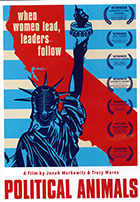
Political Animals 2016
Distributed by The Video Project, 145 - 9th St., Suite 102, San Francisco, CA 94103; 800-475-2638
Produced by Anne Clements and Jonah Markowitz
Directed by Jonah Markowitz; Co-Directed by Tracy Wares
DVD , color, 86 min.
High School - General Adult
Gay Liberation Movement, Political Science, Politics
Date Entered: 03/07/2017
Reviewed by Sophie M. Forrester, Reed Library, State University of New York at FredoniaPolitical Animals explores the work of California’s first four openly LGBT+ state legislators, all of them women. Perhaps surprisingly for a film focused on LGBT+ rights, the four women’s personal stories, such as Carole Migden’s decades-long domestic partnership and Sheila Kuehl’s past as a young actor on Dobie Gillis, are only briefly touched on. The real story here is their actions in the State Assembly, slowly building protections for LGBT+ people despite heavy resistance from their fellow legislators. The footage of their opponents’ arguments against non-discrimination measures can be upsetting, especially for queer viewers, but it’s arguably balanced out by the film’s inspirational moments. In particular, Jackie Goldberg’s comments on the power of resistance, made following the nationwide institution of marriage equality, are more relevant and more consoling than ever today.
And though the film is bookended with footage of the national response to marriage equality, it emphasizes that it is not the only issue facing the LGBT+ community. The film’s main story begins with Kuehl’s years-long fight as the sole gay Assembly member to include sexual orientation in laws regarding bullying in schools. Kuehl’s and her eventual colleagues’ frustrations with political blocks to simple measures for equality are a recurring theme in the film. So too are their personal responses to the opposition they meet, climaxing in a tearful Goldberg finding herself unable to respond to a fellow legislator's speech. The emotional effect on the four women is further demonstrated when an allied straight colleague tells the Assembly of Migden’s private anguish over the attacks on her, despite her resilience on the floor. The combination of the political and personal throughout the film makes its story compelling and relevant to all viewers, whether their interest is political, feminist, or LGBT+ oriented.
Perhaps the film’s chief flaw is its focus on Kuehl and Migden to the exclusion of Goldberg and especially Christine Kehoe, whose personal stories are only briefly discussed and whose political histories prior to entering the Assembly aren’t discussed at all. Additional commentary on the feminist meaning of these four legislators all being women would also have been a welcome addition. But then, the film is already 86 minutes long – it’s not as though it’s lacking for content. (The DVD also includes a 53-minute condensed form.)
Political Animals is an engrossing and enjoyable, though sometimes difficult, film. It is highly recommended for academic, public, and LGBT+ libraries.
-
Awards:
- Audience and Jury Awards, Los Angeles Film Festival
- Audience Award, Fresno Reel Pride Film Festival
- Jury Award, Sacramento International Gay & Lesbian Film Festival
- Audience Award, Provincetown International Film Festival
- Jury Award, Out on Film/Atlanta Film Festival
- Audience Award, ImageOut: The Rochester LGBT Film Festival
- Jury Award, San Diego International Film Festival
- Best Documentary, MiFo LGBT Film Festival
- Audience Award, NewFest: The NYC LGBT Film Festival